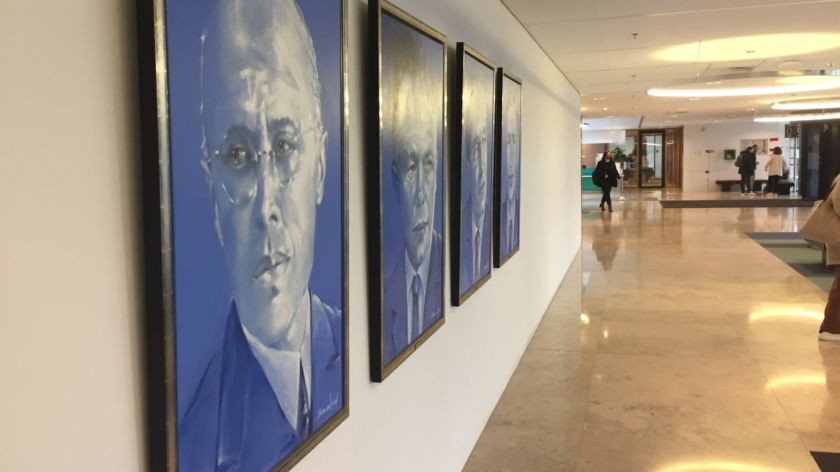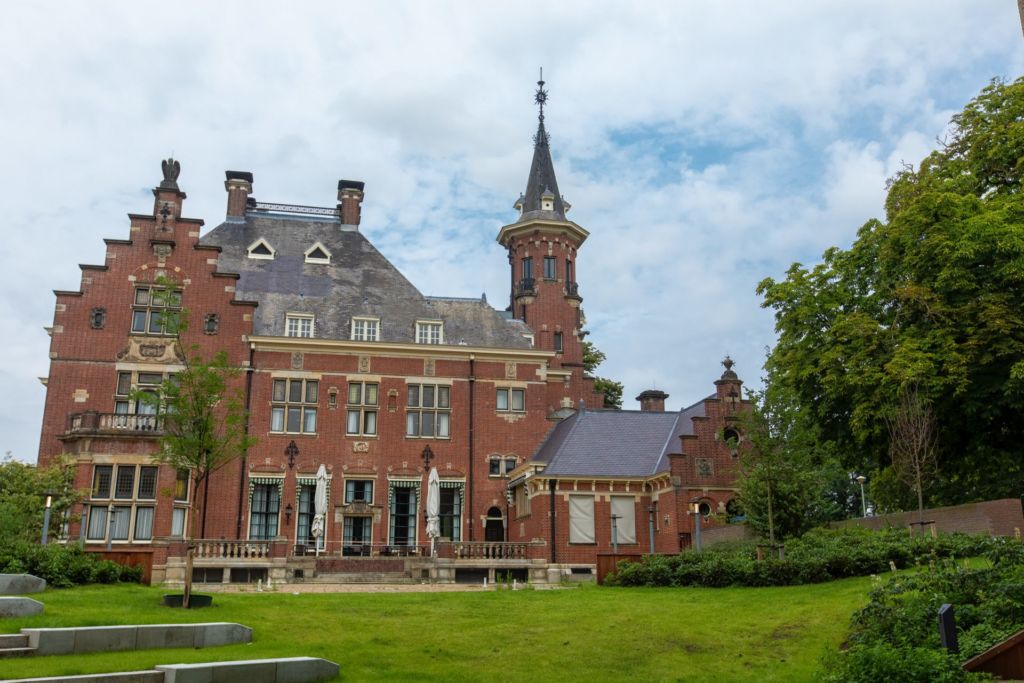‘Stop the veneration of war criminals at Radboud University’
-
 The portrait of Louis Beel (far left) alongside three other prime ministers from Nijmegen in the Grotius building. Photo by Vox.
The portrait of Louis Beel (far left) alongside three other prime ministers from Nijmegen in the Grotius building. Photo by Vox.
OPINION - Former Prime Minister and Professor at the Catholic University of Nijmegen Louis Beel was ultimately responsible for ‘extreme violence’ and ‘war crimes’ during the Indonesian National Revolution. High time to rename the Beel room in Huize Heyendael and remove Louis Beel’s portrait from the Grotius building, says Professor of Mathematical Physics Klaas Landsman.
In the press conference of 17 February on the results of the investigation carried out by the NIOD Institute for War, Holocaust and Genocide Studies, the Royal Netherlands Institute of Southeast Asian and Caribbean Studies (KITLV), and the Netherlands Institute of Military History (NIMH) into Independence, decolonisation, violence, and war in Indonesia, 1945-1950, the term ‘extreme violence’ played a central role. As the morning progressed, it increasingly became clear that this was a way to avoid the legally better substantiated and more compelling term ‘war crimes’, despite the fact that what was referred to were endless torture sessions, summary and unlawful executions of both prisoners and entirely innocent civilians, all the way to My Lai-like raids on Kampongs, resulting in at least one hundred thousand casualties.

Holding the ‘army as an institution’ accountable for this violence eliminated the need to point to any particular individual as a war criminal. In his first reaction, on that same day, Prime Minister Rutte also seemed to struggle with this concept, although he did take a first step by holding the ‘authorities of the time’ accountable for this extreme violence. On Sunday 20 February, Frank van Vree, who led the investigation on behalf of the NIOD, stated in the Radio NPO1 programme OVT that it would have been better if people had used the term ‘war crimes’. A statement which made the evening news.
In his excellent book Revolusi (2020), in which he already anticipated much of the work of the NIOD and Co., David van Reybrouck is not afraid to name names (on p. 471): the highest officials responsible for the Dutch war crimes were General Simon Spoor, Attorney General Henk Felderhof of the Supreme Court for the Dutch East Indies, Lieutenant-Governor-General Huib van Mook, and, at the highest political level, Louis Beel, Prime Minister from 1946 to 1948. Beel’s role in the Dutch policy was anything but abstract or distant; in August 1948, he even relocated as High Representative of the Crown in the Dutch East Indies to Batavia and was known among other things as the central driver behind the ‘Second Police Action’. What’s more, both Beel and his successor Drees are held responsible for the staggering fact that, following the transfer of sovereignty in 1949, it was not the Netherlands but the long exploited and enslaved Indonesia that was forced to pay its coloniser a compensation equivalent to €15 billion at the current purchasing power.
Minister of State
It is partially a legal and partially a semantic question whether we can refer to these four men (and with them undoubtedly others) as war criminals; the investigation has in any case made it clear that they ‘condoned, concealed, and promoted’ the ‘extreme violence’ (read: the Dutch war crimes), and made sure the perpetrators suffered little to no punishment. Even though the violence was kept away from the administrators, thanks to filtering in the communications, strengthened by ‘colonial dissociation’, they clearly knew what was going on. In an email, Frank van Vree confirmed upon request that Beel ‘was to a very large extent responsible for the extreme violence.’

How should we judge this situation with our current knowledge? It turns out that there are still army barracks named after Spoor (in Ermelo), and especially Beel was held in very high regard until his death in 1977, among other things by being offered the positions of Vice-President of the Council of State and Minister of State. In the first position, which he held from 1959 until 1972, Beel for example passed the notorious Statute of Limitations of the De Jong administration, which exonerated perpetrators of war crimes in the Dutch East Indies from criminal prosecution – thereby also signing his own amnesty.
Growing radicalisation
There are even a number of streets named after Beel. At Radboud University (where Beel was Professor from 1949 until 1951), our meeting centre, Huize Heyendael, has a Beel room, and Beel’s portrait hangs in the Grotius building. The same is true of the three other prime ministers with a Catholic People’s Party background that were alumni of the Catholic University of Nijmegen, aka Marijnissen, Cals, and Van Agt, the last of whom is still alive and one may well wonder, in view of the increasingly radical political views he has held with advancing years, how he feels about hanging so honourably next to Beel.
‘What would Dries van Agt think about his portrait hanging next to that of Louis Beel?’
It is incredibly important that we hold ourselves accountable for the past, and that we let both ourselves and Indonesia know what and who we abhor (as well as who and what we admire and are prepared to stand for). There may be broader contexts at play, but ultimately we also need to consider at the individual level who made the choices that led to atrocities or, on the contrary, improvements. Ironically enough, it is usually efforts towards the latter that lead to the former, but we cannot condemn extreme violence or war crimes while at the same time continuing to honour the direct or indirect perpetrators.
Deep outrage
From now on, I want our meetings at Huize Heyendael to take place in the Joop Hueting room and to wave our girls and boys on their way to a peace mission good-bye in the Poncke Princen barracks. Joop Hueting was the whistleblower who in 1968 brought the Dutch war crimes committed between 1945 and 1949 to the public’s attention, and named them as such, not sparing himself in the process. This led to the 1969 Note on Excesses, in which, aside from acknowledging a few incidental abuses, the Netherlands largely proceeded to pat itself on the back for a clean military operation. This government position was maintained until 17 February, when shortly after the press conference, Mark Rutte finally recognised the structural and extreme violence committed by the Dutch, and apologised to Indonesia.
Poncke Princen deserted in 1948, partly in response to the misconduct of his colleagues in the Dutch army, and defected to the Indonesian National Armed Forces (TNI). Despite being awarded a distinction by Soekarno in 1949, he nevertheless spent many years in prison during his regime. The responses to my earlier opinion piece in NRC revealed that his name still invokes deep outrage among veterans or their descendants, more so than Hueting’s, although the latter too has in recent years been the recipient of death threats from KNIL veterans, such that security measures had to be taken to protect him.
An earlier version of this opinion piece appeared on Saturday 19 February in NRC Handelsblad. The author introduced a few changes for Voxweb, among other things concerning Louis Beel’s presence to this day on the Radboud University campus.



